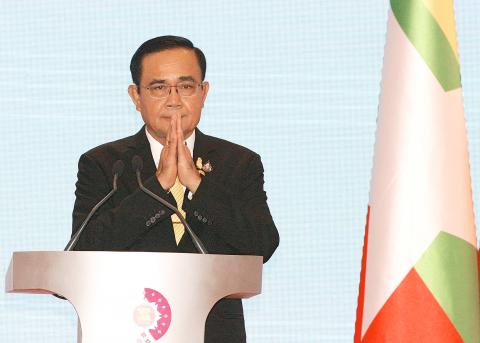Southeast Asian leaders yesterday pressed their call for self-restraint in the disputed South China Sea and renewed their alarm over the US-China trade dispute, with one leader saying it might spiral out of control.
Long-raging territorial conflicts and the protracted trade dispute are high on the agenda in the final two days of meetings of ASEAN leaders.
Facing regional predicaments, such as the Rohingya refugee crisis in Myanmar, the leaders took the stage in Bangkok and clasped their hands together in a trademark ASEAN handshake to project unity.

Photo: EPA-EFE
This year’s host, Thai Prime Minister Prayuth Chan-ocha, opened the summit with a call for regional unity and a push for the bloc to conclude a massive free-trade pact with China and five other Asia-Pacific nations to cushion any impact from the US’ trade conflicts with China.
“The winds of protectionism that are battering the multilateral system remind us that we must hang on ever stronger to one another,” Prayuth said.
The US is not included in the Regional Comprehensive Economic Partnership, which Prayuth said would encompass the world’s largest free-trade region.
Officials from Singapore, Thailand, Indonesia and Vietnam are to be at the G20 summit later this month in Japan, where US President Donald Trump and Chinese President Xi Jinping (習近平) are expected to meet.
“ASEAN hopes there will be discussions that lead to an easing and resolution of these problems, because they affect many countries,” Prayuth said.
Philippine President Rodrigo Duterte on Saturday told other leaders that the trade conflict “is creating uncertainty. It is taking a toll on global growth and it could hinder the ongoing processes of economic integration.”
“The US and China must both take the high road and resolve their differences before the situation spirals out of control,” Duterte said.
In their public communiques, the leaders have avoided naming the US, China or specific nations embroiled in controversial issues in a show of their conservative protocols, but the leaders could raise thorny issues in a closed-door and informal session.
Duterte has said that he would raise the territorial conflicts in the South China Sea following the June 9 ramming of an anchored Philippine boat by a larger Chinese fishing vessel in the disputed Reed Bank (Lile Bank, 禮樂灘).
In a statement outlining their regional policies, the leaders yesterday renewed their call for nations involved in the territorial spats to “exercise self-restraint in the conduct of activities and avoid actions that may further complicate the situation, and pursue the peaceful resolution of disputes in accordance with international law.”
Four ASEAN states — the Philippines, Vietnam, Malaysia and Brunei — along with Taiwan and China are locked in disputes over the strategic waterway.
ASEAN has been in talks with China to negotiate a nonaggression pact called the “code of conduct” to prevent major armed clashes in the region.
Southeast Asian diplomats have told reporters that the first of three rounds of talks on the proposed pact was expected to be completed this year.

MAKING WAVES: China’s maritime militia could become a nontraditional threat in war, clogging up shipping lanes to prevent US or Japanese intervention, a report said About 1,900 Chinese ships flying flags of convenience and fishing vessels that participated in China’s military exercises around Taiwan last month and in January have been listed for monitoring, Coast Guard Administration (CGA) Deputy Director-General Hsieh Ching-chin (謝慶欽) said yesterday. Following amendments to the Commercial Port Act (商港法) and the Law of Ships (船舶法) last month, the CGA can designate possible berthing areas or deny ports of call for vessels suspected of loitering around areas where undersea cables can be accessed, Oceans Affairs Council Minister Kuan Bi-ling (管碧玲) said. The list of suspected ships, originally 300, had risen to about 1,900 as

Japan’s strategic alliance with the US would collapse if Tokyo were to turn away from a conflict in Taiwan, Japanese Prime Minister Sanae Takaichi said yesterday, but distanced herself from previous comments that suggested a possible military response in such an event. Takaichi expressed her latest views on a nationally broadcast TV program late on Monday, where an opposition party leader criticized her for igniting tensions with China with the earlier remarks. Ties between Japan and China have sunk to the worst level in years after Takaichi said in November that a hypothetical Chinese attack on Taiwan could bring about a Japanese

MORE RESPONSIBILITY: Draftees would be expected to fight alongside professional soldiers, likely requiring the transformation of some training brigades into combat units The armed forces are to start incorporating new conscripts into combined arms brigades this year to enhance combat readiness, the Executive Yuan’s latest policy report said. The new policy would affect Taiwanese men entering the military for their compulsory service, which was extended to one year under reforms by then-president Tsai Ing-wen (蔡英文) in 2022. The conscripts would be trained to operate machine guns, uncrewed aerial vehicles, anti-tank guided missile launchers and Stinger air defense systems, the report said, adding that the basic training would be lengthened to eight weeks. After basic training, conscripts would be sorted into infantry battalions that would take

DEEP-STRIKE CAPABILITY: The scenario simulated a PLA drill that turned into an assault on Taiwan’s critical infrastructure, with the launchers providing fire support Taiwan yesterday conducted this year’s first military exercises at Longsiang Base in Taichung, demonstrating the newly acquired High Mobility Artillery Rocket System’s (HIMARS) ability to provide fire support and deep-strike capabilities. The scenario simulated an attack on Penghu County, with HIMARS trucks immediately rolling into designated launch areas and firing barrages at the Wangan (望安) and Cimei (七美) islands, simulating the provision of fire support against invading forces. The HIMARS are supposed to “fire and leave,” which would significantly increase personnel and equipment survivability, a military official said. The drill simulated an exercise launched by the Chinese People’s Liberation Army (PLA) Eastern